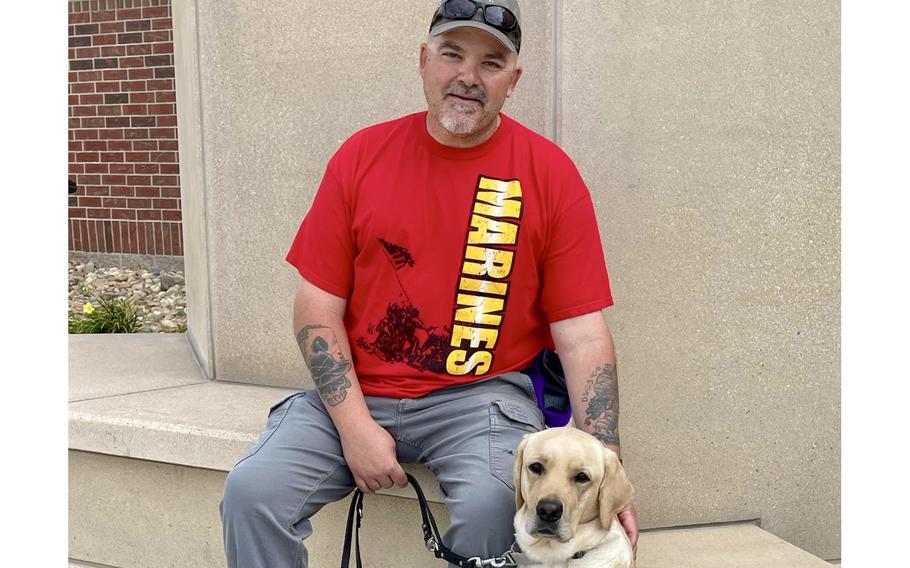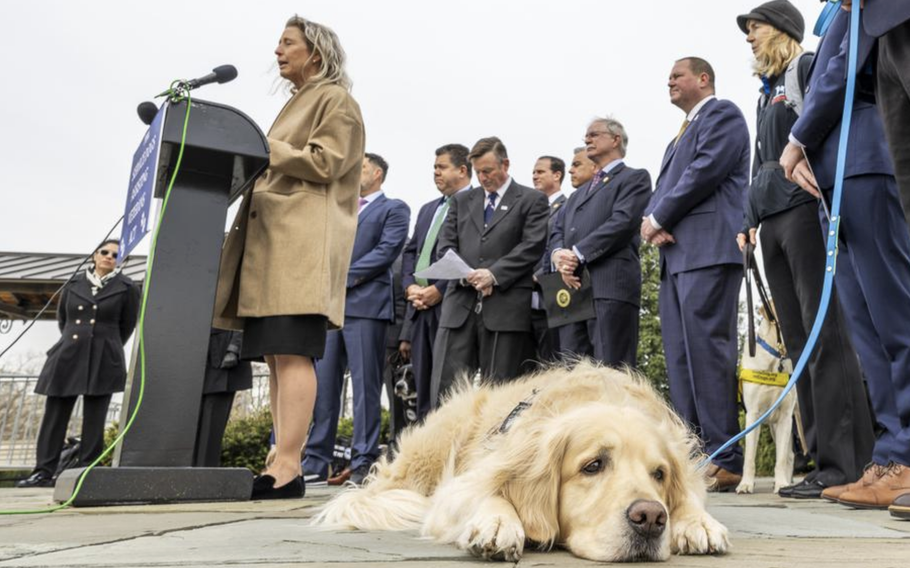
Hank Ford, a veteran of the Army and Marine Corps, sits with his service dog, Tommy, he acquired in 2023. Ford credits Tommy for alerting him to a heart problem that prompted him to get lifesaving treatment at a local hospital. (Dogs Inc.)
WASHINGTON — Hank Ford, a 54-year-old Army and Marine Corps veteran, was dozing one morning in February after his wife left for work, when his service dog, Tommy, started barking and pawing his chest to wake up — something he had never done before.
Ford, a retired staff sergeant who served in the military for 20 years, said he got up thinking the Labrador retriever wanted to go outside. But Tommy instead kept barking and jumping up to paw his chest.
Ford said he felt dizzy and realized his heart was racing. He took his blood pressure, saw his “heart rate was out of control” and rushed to a local hospital. Doctors said he had atrial fibrillation, which causes the heart rhythm to spike, and was at imminent risk of a stroke.
Ford underwent an emergency procedure to shock his heart back to a normal rhythm and credits Tommy for alerting him to the life-threatening problem.
“Service dogs have a purpose for disabled vets like me, and they serve that purpose fully. He saved my life,” Ford said.
Legislation pending in Congress called the Service Dogs Assisting Veterans Act, or SAVES Act, would award $10 million annually in funding to help nonprofits meet a growing demand by disabled veterans for service dogs, supporters contend.
The legislation would authorize the Department of Veterans Affairs for the first time to award grants to nonprofits to train and place service dogs at no cost to disabled veterans. Nonprofits that specialize in breeding and training service dogs now largely rely on donations to cover costs that can reach $50,000 per dog, lawmakers said.
The legislation cleared the Senate Veterans’ Affairs Committee on July 30 after passage in the House Veterans’ Affairs Committee. Supporters are hoping the legislation will advance to a final vote when Congress reconvenes in September.
“The Service Dogs Assisting Veterans Act will ensure more veterans have access to highly trained service dogs, expanding support beyond [post-traumatic stress disorder] to include those suffering from traumatic brain injuries, paralysis, military sexual trauma and other service-related conditions. This is about giving our heroes the tools they need to thrive, not just survive, when they come home,” said Rep. Morgan Luttrell, R-Texas, a Navy veteran who led the House version of the bill.

Rep. Jen Kiggans, R-Va., speaks in support of the SAVES Act, which would help nonprofits provide service dogs to disabled veterans at no cost. Cooper, a golden retriever from the nonprofit Warrior Canine Connection, rests during the April news conference in Washington, D.C. (Eric Kayne/Stars and Stripes)
Disabled American Veterans, the Elizabeth Dole Foundation, the Iraq and Afghanistan Veterans of America and Semper K9 Assistance Dogs are among more than two dozen nonprofits that have endorsed the bill.
“There’s a lot of need for service dogs and a long waitlist. Demand is high. This bill would help organizations like ours fulfill our mission and meet the needs of more veterans,” said Bill McCabe, vice president of government and external affairs at K9s for Warriors, which trains and places rescue dogs with disabled veterans.
Service dogs provide “a sense of purpose that pills and therapy simply won’t ever do,” Cole Lyle, veterans affairs and rehabilitation director at the American Legion, said during a House hearing.
Ford said he obtained Tommy in 2023 as an 18-month-old from Dogs Inc., a Florida-based nonprofit organization that provides service dogs at no cost to recipients.
“My VA therapist encouraged me to get a service dog when I started slipping back into a dark place,” said Ford, who has PTSD.
Ford, who is 100% disabled, served in the military from 1989 to 2009 with multiple deployments to the Middle East.
He said he was paired with Tommy to help him with depression and the negative thoughts that he experiences from PTSD, a mental health condition that results from witnessing traumatic events.
“He’s not a medical alert dog and was never trained to spot medical conditions. Everybody is pretty much amazed,” Ford said about the dog’s actions that led him to get medical help. “He never barks. It was totally out of character to try to get my attention the way he did — and not stop.”
Tommy first arrived with a trainer at Ford’s home in September 2023.
“We bonded fast,” Ford said. “They told me the bond would continue to grow but I felt it right away.”
He had waited nine months for Tommy, after an initial phone interview about his needs and expectations for a service dog. Tommy now accompanies Ford every day, including to the VA, his volunteer job at a golf course and the grocery store, Ford said.
He said his wife began to see a change in him soon after Tommy’s arrival.
“She said it’s been dramatic and talks about it all the time,” Ford said. “I feel more at ease. I’m not in my own mind. Tommy wasn’t the light at the end of the tunnel. He turned the lights back on.”